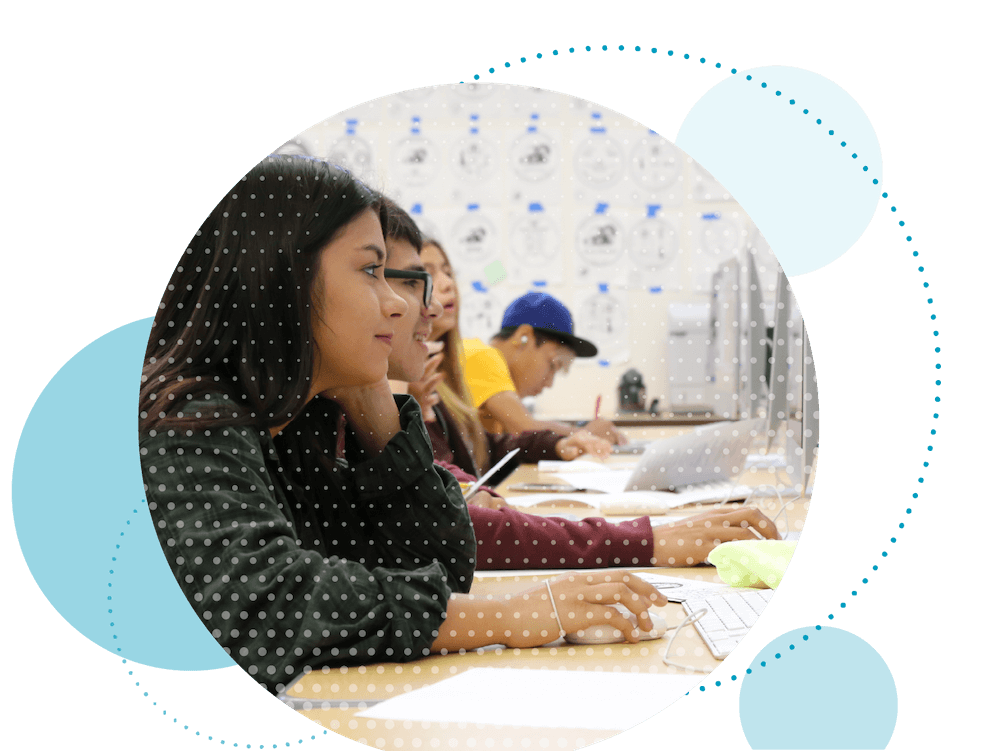Our Network
Resources and Tools
Professional Development for Project Based Learning (PBL)
Project-Based Learning (PBL) represents a transformative approach to education and requires a shift in instructional methods and professional development. To implement PBL, teachers need initial support to develop a solid foundational understanding of PBL instructional practices, student-centered practices, and equity-centered practices. To sustain PBL, teachers not only need ongoing opportunities for professional growth but also the school requires a transformative approach that attends to multiple components of schooling.
To achieve lasting transformation, New Tech Network schools are committed to the four key focus areas of college and career ready outcomes, supportive and inclusive culture, meaningful and equitable instruction, and purposeful assessment.
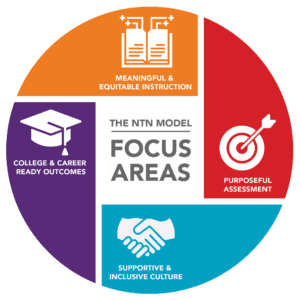 By developing expertise in each of these four domains, schools benefit from discovering the ways each distinct area reinforces the other three. Teachers and school leaders operate in an environment built on a vision and collective action. The student experience is tied directly to deeper learning outcomes. Through PBL, students gain skills and use their voices in ways that prepare them for life beyond school.
By developing expertise in each of these four domains, schools benefit from discovering the ways each distinct area reinforces the other three. Teachers and school leaders operate in an environment built on a vision and collective action. The student experience is tied directly to deeper learning outcomes. Through PBL, students gain skills and use their voices in ways that prepare them for life beyond school.
One example of a transformative approach to a whole system is Central Hardin High School in Hardin County, Kentucky, which successfully scaled its PBL implementation by forming a leadership team with teachers from each department, guided by a PBL coach. This team, building on initial PBL training from NTN, played a key role in supporting and advancing instructional and cultural practices throughout the community.
The Fundamentals of Project-Based Learning
Project-based learning (PBL) is an inquiry-based and learner-centered instructional approach that immerses students in real-world projects that foster collaboration, communication, and critical thinking skills. At its core, PBL involves students working on authentic, challenging problems, connecting to community members, higher classroom engagement, and a deep understanding of content. Whether implementing project-based learning for the first time or refining your practice over years of experience, NTN’s support can be an opportunity for teachers to further their PBL practice. For more insights into PBL, refer to our website articles here: “The Comprehensive Guide to Project-Based Learning: Empowering Student Choice through an Effective Teaching Method” and “The Benefits of Project-Based Learning“.
The Evolving Role of Educators in PBL
The role of the instructor shifts to a facilitator of student inquiry and a cultivator of a supportive and inclusive environment. Rather than merely delivering content like in traditional teaching, instructors guide students through the project process, fostering a collaborative and student-centered environment. They support student inquiry by providing scaffolding, encouraging critical thinking and collaboration, and promoting self-directed learning. This shift not only empowers students to take ownership but also helps students develop essential skills for future success.
In addition to building meaningful and equitable environments, teachers must establish and maintain a supportive and inclusive classroom culture that supports all students in growing and tackling the demanding work of project-based learning. The changing roles of teachers require ongoing adult support that enables new ways to facilitate deeper learning.
Core Principles of NTN’s Professional Development
Strong adult learning is at the center of the New Tech Network’s (NTN) work with schools. Whether in-person or virtual, NTN creates an experience and workshop activities that models what we hope to see in schools: a focus on meaningful and equitable instruction and an inclusive and supportive culture. The following resources and strategies are aligned with these goals.
The NTN Principles of Adult Learning
The NTN Principles of Adult Learning are a collection of guidelines derived from extensive research, aimed at shaping the design and delivery of effective teacher professional development. They are:
- Foster Emotional Connections
- Cultivate Purposeful, Task-Oriented Learning
- Promote Self Direction
- Facilitate Internalizing of Learning
These principles recognize the unique needs and preferences of adults, taking them into account in the creation of tailored learning experiences. Understanding these principles is crucial for leaders and educators as they facilitate adult learning experiences. They help ensure that learning is effective, engaging, and relevant to the learners’ needs and experiences. Click the link to download the NTN Principles of Adult Learning and the checklists that provide examples of how these principles can be implemented in adult experiences.
Learner Choice & Agency
When designing adult learning for PBL and learner-centered environments, model for adult learners what they should be doing in their classrooms. Allow teachers to be in the shoes of a student so they can experience what learner choice looks and feels like from the lens of a participant.
Additionally, adults want to be in charge of their learning and should therefore have some control over how learning is structured and conducted. Strong professional development opportunities provide a variety of options during work time, creating time for processing new information or applying learning, options for capturing new ideas, a variety of technology uses, and options for designing PBL resources.
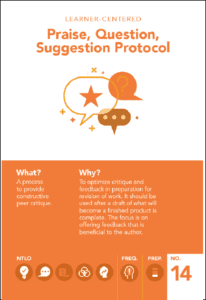
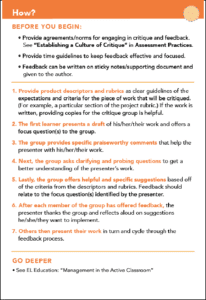
Feedback
Adults need direct, concrete experiences in which they apply and reflect on what they have learned. It is imperative that adults incorporate critique protocols for peer feedback on project ideas and design during initial PBL training and throughout the year to improve project design and implementation in the classroom. One example of project feedback used in most NTN PBL trainings is Praise, Question, Suggestion. The focus of this particular protocol is on offering feedback that is beneficial to the author. Adults or students alike can use this feedback protocol in preparation for revision of work or project design. By creating a supportive environment that allows PBL educators to learn from their mistakes, you can foster an asset-based culture of continuous learning and improvement, reflection, and the mastery of new skills through time and practice. For more examples of feedback practices for adults and students like Praise, Question, Suggestion click the link to download our NTN Practices Cards Sample Set.
Social-Emotional Support
NTN’s Focus Area of Supportive and Inclusive Culture fosters a school-wide culture of belonging, care, community, and growth for adults and students. This type of culture helps ensure that students and teachers alike have ownership over their learning experience and school environment. Adults’ emotional states are inextricably tied to their ability to learn. Strong professional development implements culture practices that support building relationships, empathy, and the use of metacognitive prompts. One example of a culture practice that builds relationships and empathy is Co-Creating Community Agreements which are consensus-driven co-created
process that identifies what every member of the group needs to collaborate and feel
supported and included. Community Agreements can be established in large groups of adult learners and ongoing learning in PLCs.
For more examples of culture practices for adults and students like the Co-creating Community Agreements card above, click the link to download our NTN Practices Cards Sample Set.
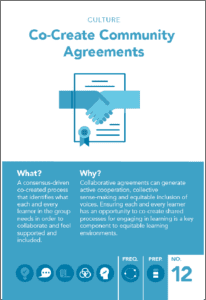


Cultivating Continuous Growth and Innovation in PBL
New Tech Network works closely with district leaders, school principals, and classroom educators, to co-design change strategies that are specific to their context and improvement priorities. Currently, there are two avenues in which NTN supports schools:
The NTN Model or Individual Services to Build Deeper Learning.
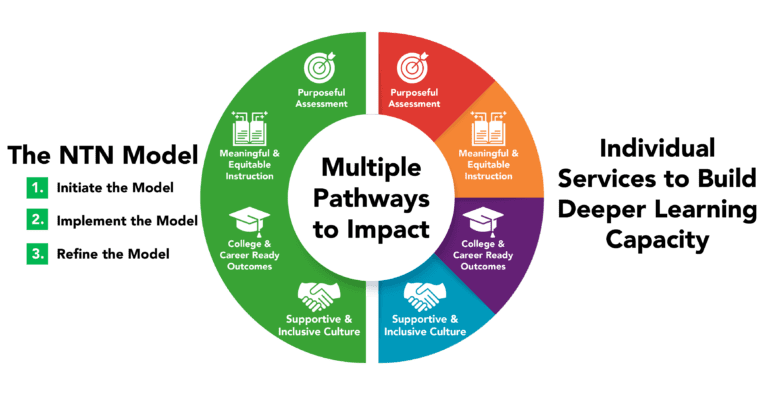
The Model
The purpose of the New Tech Network Model is to enable schools to prepare each student for post-secondary success with the knowledge, skills, and mindsets to be ready for college and career. Schools use the NTN Model to support college and career ready outcomes through meaningful and equitable instruction, purposeful assessment, and a supportive and inclusive culture.
At New Tech Network, college and career readiness is defined by the New Tech Network Learning Outcomes, five research-based outcomes designed to allow teachers to support and assess students based on a holistic picture of their skills while meeting state academic requirements. Initially designed and grounded in the work of David Conley and Camille Farrington, with ongoing updates informed by the work of Tara Yosso and others, NTN found that when teachers define, scaffold, and assess learning in the five New Tech Network Learning Outcomes – Knowledge and Thinking, Oral Communication, Written Communication, Collaboration, and Agency – students can acquire necessary readiness skills.
At New Tech Network, we utilize a planning year to engage in a series of activities that allow for a successful implementation of the New Tech Network Model. We sequence a set of virtual check-ins, in-person learning experiences, and administrative tasks that allow the school to prepare for project-based learning, build adult culture, and redefine student learning outcomes.
Year One of implementation is designed around early learning targets in service of key experiences and growth in the NTN Focus Areas within your school’s context. You will be assigned an NTN coach to lead you through five onsite learning experiences (designed with you to support both your whole school team and your leadership team) as well as ongoing remote coaching for both school leaders and teachers.
Schools will identify during their planning year with their Director of District and School Success what their scope of implementation looks like. Schools might bring on one grade at a time, multiple departments at a time, or all staff at once in smaller schools.
Individual Services to Build Deeper Learning Capacity
Historically, NTN has exclusively engaged with districts and schools through its school model, with over 20 years of experience in implementation. Recognizing the need to expand our impact, NTN developed Individual Services for Deeper Learning. These services offer elements of The Model without requiring full implementation, providing entry points for schools and districts not ready for whole school transformation. They aim to impact as many schools, districts, students, families, and communities as possible by offering more accessible, bite-sized approaches to deeper learning.
NTN is committed to supporting schools and districts to achieve their vision of student success. In addition to the whole school model approach, NTN offers Individual Services to Build Deeper Learning Capacity, a selection of professional development services designed to build educator capacity and develop leadership skills that enable schools to strengthen instruction, culture, assessment, and college and career readiness.
- Services for Leadership and Leadership Teams
- Services for Educators and Classroom Instruction
- Services for District and Instructional Coaching
At NTN, we believe that in order to ensure each student develops outcomes that matter, their learning experiences must exhibit conditions that reflect deeper learning. Those deeper learning conditions are: authentic, active, relational, responsive, and complex.
Conclusion
Project-Based Learning (PBL) represents a transformative approach to education, requiring a shift in both teaching and learning for educators. The role of the educator in PBL is to facilitate learning, encouraging student inquiry, critical thinking, and self-directed learning. Effective supports for adult learning, are essential for equipping educators with the skills and strategies needed to implement PBL successfully. By fostering continuous growth and innovation through workshops, events, and individual services, NTN supports educators in creating meaningful, equitable, supportive and inclusive learning environments that prepare students for success in college and career.
